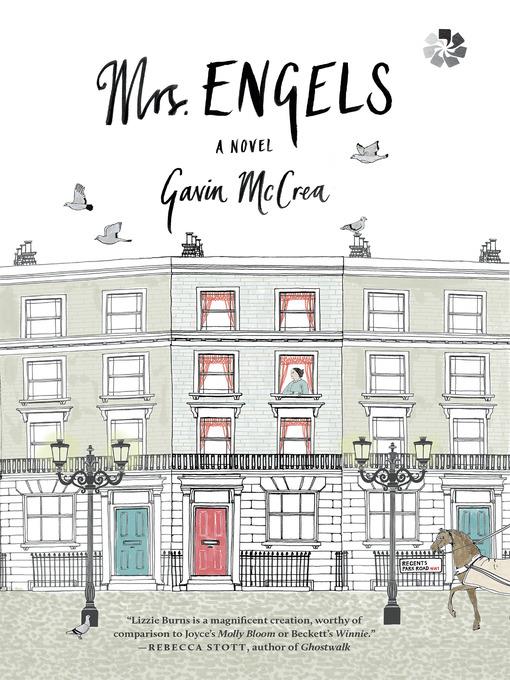
Mrs. Engels
A Novel
کتاب های مرتبط
- اطلاعات
- نقد و بررسی
- دیدگاه کاربران
نقد و بررسی

Starred review from June 22, 2015
McCrea’s richly imagined debut novel is narrated by Irishwoman Lizzie Burns, the longtime lover of The Communist Manifesto coauthor Frederick Engels. In 1870, the couple leaves Manchester (where the wealthy Engels family once employed Lizzie at their cotton mill) to reside in London. Lizzie’s new life is opulent but empty: she is uncomfortable with upper-class society and excluded from most of Frederick’s activities, including his cerebral efforts to liberate her own class. Struggling to find a purpose, Lizzie seeks out her old flame, the Irish radical Moss O’Malley, whose cause always needs funds. She attempts to help the illegitimate son that Frederick had two decades before and seems to have forgotten. Even as she fights for others, Lizzie nurses wounds of her own: she longs to be married, despite Frederick’s disdain for such conventions, and she fears that he will never forget her deceased sister Mary, who was his former lover. McCrae gives the illiterate Lizzie a vivid, convincing voice, sparkling with energy and not untouched by pathos. Her sharp, pragmatic observations offer a human perspective on historical icons (Marx has boils, while Engels is overwhelmed by letters from his mother). But the heart of the novel is the beautifully realized romance between Lizzie and Frederick: a mismatch of values and temperaments, yet also a tender and complex bond.

Starred review from August 1, 2015
Irish-born McCrea's stellar debut imagines the lives of Karl Marx and Frederick Engels, not men usually associated with romance, through the eyes of Engels' illiterate common-law wife, Lizzie Burns. Lizzie's voice-earthy, affectionate, and street-smart but also sly, unabashedly mercenary, and sometimes-scheming-grabs the reader from the first sentence and doesn't let go. As the novel opens in 1870, Lizzie is moving with Frederick to London as his live-in lover. He wants to be closer to Marx, whom he has long supported financially. Lizzie is excited to move into a grand house but has mixed feelings about Karl's wife, Jenny, herself a fascinating combination of bourgeois sensibilities, love of family, and survival instincts. In the past, Jenny was not kind to Lizzie's older sister, Mary, the first Burns sister with whom Frederick was involved. Growing up in Manchester, the Burns girls worked at Ermen & Engels, the mill that German-born Frederick came to manage for his family in 1842. Mary quickly fell into a serious love affair with Frederick. Although he left Manchester for eight years, "writing his books and chasing the great revolutions around Europe," Mary eventually quit the mill and lived openly with him. When Lizzie's own romantic involvement with Moss, an alcoholic Fenian, soured, she moved in with Mary to keep house. She witnessed Mary's relationship with Frederick turn turbulent after he apparently fathered an illegitimate baby with the Marxes' maid, Nim. Shortly after Mary's death, Lizzie's own sexual liaison with Frederick began. By 1870 their relationship has endured-even thrived-for years, providing for Lizzie attraction, affection, and practical financial security. Forget Marx and Engels as authors of The Communist Manifesto. For Lizzie (and McCrea), social mores trump politics, while individual loyalties and needs are what ultimately matter. Who knew reading about communists could be so much fun?
COPYRIGHT(2015) Kirkus Reviews, ALL RIGHTS RESERVED.

August 1, 2015
Former Manchester mill worker Lizzie Burns has moved into a London townhouse with her lover, political theorist Frederick Engels, as he continues his job of organizing the working classes with Karl Marx. This is Lizzie's first experience running a "proper" household--managing servants, placating the Marxes, and entertaining dissidents from around Europe. All the while, she remains Engels's most loyal helpmate, even as she outlines his past romantic relationship with her late sister, Mary, and her own former love, an Irish nationalist. Through Lizzie's singular perspective, peppered with her wry observations, readers are treated to a backstage look at the domestic lives of the most public 19th-century revolutionaries and their families. While Lizzie's story exists only marginally in the historical record, first-time novelist McCrea brings her to life in this soulful work. VERDICT Lizzie's distinctive working-class Irish spin on the foibles of upper-crust London society is at once biting and humorous, and Dublin-born world traveler McCrea is a new author to follow for those who enjoy potential Man Booker Prize longlisters. It is a pity that the full biography of the Burns sisters may never be told in nonfiction, yet readers will feel that McCrea has done them justice here.--Jennifer B. Stidham, Houston Community Coll. Northeast
Copyright 2015 Library Journal, LLC Used with permission.

Starred review from September 1, 2015
Illiterate Irishwoman Lizzie Burns is the lover of Frederick Engels, coauthor of The Communist Manifesto. But unlike Engels and his comrade Karl Marx, she does not romanticize poverty, having been raised in mean circumstances, and is grateful for her much-improved station. Engels funds Marx's great cause with the profits from his cotton mill in working-class Manchester, and in 1870, he and Lizzie move to a grand house in London to be nearer to the Marxes. Her discomfort with the servants and exclusion from Engels' social circle and from his activism only serve to make her feel more deeply her impoverished background. Lizzie, pragmatic and opinionated, takes note of Marx's carbuncles and his wife Jenny's propensity to act the drama queen, but beneath her stinging appraisals, she is tenderhearted, grieving the death of her sister, Engels' previous lover, and pining for her lost love, Irish rebel Moss O'Malley. First-novelist McCrea well captures Lizzie's fiery temperament, vivid voice, and complicated relationship with Engels, whom she both longs to marry and longs to be free of. Moving, finely detailed, rife with full-bodied, humanizing portraits of historical icons, and told in striking prose, this is a novel to be savored.(Reprinted with permission of Booklist, copyright 2015, American Library Association.)

























دیدگاه کاربران